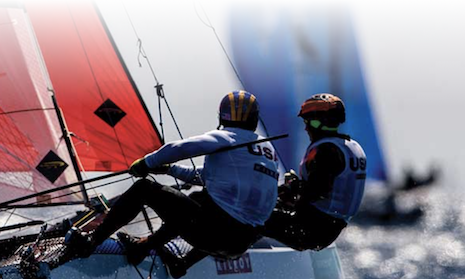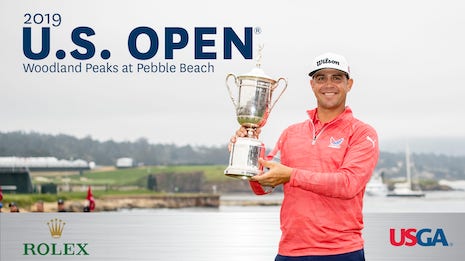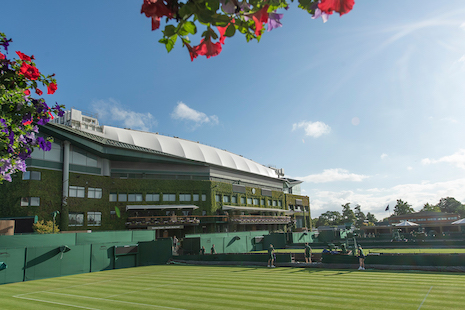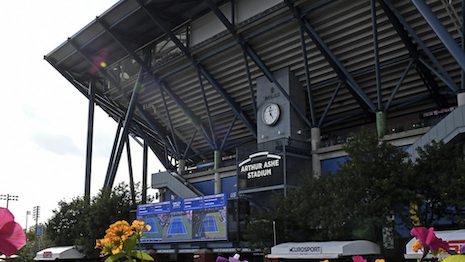Luxury brands have a legacy in sports sponsorships, but will this change now that several professional sports organizations have been forced to re-imagine their 2020 live-event schedules with COVID-19 social-distancing rules?
Rolex, Citizen, American Express, Lexus, Mercedes-Benz and BMW are among brands that support sports such as polo, golf, tennis, Formula 1 and sailing to reach an affluent demographic in their leisure time. These sponsors will likely come back, but it could be different than before.
“Many of these brands already in the space are likely to continue to sponsor sports, in part because they are active in the sports that might return first, less arena-packed and more broadcast-focused,” said Elena Klau, global chief strategy officer and chief analytics of Momentum Worldwide.
“Think golf, tennis, sailing," Ms. Klau said. "In these sports, broadcast is the main conduit for fan experience, and one in which the spectacle of a live audience is less a part of the experience like NFL and MLB.”
 US Sailing will continue this year. Image credit: US Sailing
US Sailing will continue this year. Image credit: US Sailing
Broadcast potential
Sailing and Formula 1 will likely be the least hit with sponsorships because they are not losing their audience. The events are not about packing the stadium.
“Those brands might not see such a big loss versus brands that have focused on sports which rely heavily on in-stadium attendance, both for revenue and for the fan experience like NFL, NBA, MLB and college sports,” Ms. Klau said.
“The PGA is already gearing up for a fall season, where golf tournaments will be geared toward broadcast eyeballs rather than live attendee eyeballs,” she said. “It is likely that tennis, sailing and similar types of sports will be doing the same.”
This works for many of these luxury legacy brands because in many cases, this is how luxury brands have built their sponsorship packages — broadcast rights paired with bespoke hospitality experiences.
“Those luxury brands that have built their sponsorship packages on in-stadium activation packages will likely need to revisit their agreements and identify like-for-like asset swaps in the near-term,” Ms. Klau said.
“I don’t see people signing new deals, but the ones that have legacy relationships — especially where there is a big potential broadcast viewership — they are going to be fine, and be happy with being there, based on the pent-up demand we are seeing for live sports viewing,” she said.
Sports that can be played and televised will still attract attention, and the luxury brands will follow.
"Even behind closed doors, sports events represent a fantastic entertainment moment," said Anthony Schaub, founder of The Consultancy Group, Geneva.
"TV audiences will remain important and it will be a good opportunity to develop an additional experience for the fans on digital platforms," he said.
 Rolex sponsors the golf U.S. Open at Pebble Beach last year. Image credit: US Open
Rolex sponsors the golf U.S. Open at Pebble Beach last year. Image credit: US Open
Hospitality losses
One of the biggest losses in the short-term will likely be hospitality assets, as there are many luxury brands that only invest in hospitality at sports properties.
“We are going to see for a while that as sports return, they are going to come back without in-arena/stadium fans,” Ms. Klau said.
“There is a big presumption that hospitality will be cut as a result of this,” she said.
The PGA has already been talking about the cutback in hospitality experiences as it launch the first phase of its plan — tournaments without fans.
“We believe this could be a big opportunity for luxury brands who traditionally use hospitality for customer engagement,” Ms. Klau said. “When you look at a lot of luxury brands and their mix of assets, it’s often broadcast rights plus hospitality assets allowing them to achieve both scale as well as intimate, in-person selling and hosting moments.”
“So, with the absence of hospitality assets for at least the short-term, these luxury brands will need to get creative,” she said.
All brands will need to start to consider how they will build that more intimate connection within the context of sponsorships if the traditional assets such as hospitality are not immediately available.
“That’s where we will see interesting things happen with virtual experiences,” Ms. Klau said.
“Can brands use their access to talent in an interesting way?" she said. "I anticipate brands who are sports-adjacent such as American Express and LVMH will be more willing to innovate and think about what an experience really means.”
 The clubhouse view at Wimbledon. Image credit: Wimbledon
The clubhouse view at Wimbledon. Image credit: Wimbledon
Digital innovations
Luxury brands have an opportunity to reach consumers in new and innovative ways as audiences become more reliant on digital for content and connections.
"Investment in digital channels was already a trend before the outbreak," Mr. Schaub said. "This period has just accelerated the process. Today, experience is key. From promotional experience, on-site experience to digital experience, the ones that can distinguish themselves in all experiences will be rewarded.
"We will see some expected synergies between platforms and audience bases, and I believe that this might also create some unexpected yet successful and powerful synergies," he said.
This transition is already underway, but the pandemic has pushed the acceleration into warp speed.
Leagues, teams and properties had already developed strong offerings of digitally enhanced experiences in the virtual reality (VR) and gaming realm, but fans were slow to adopt.
“Now that people are at home, they are trying new technologies and platforms, whether it is eSports, in-gaming concerts, Zoom celebrity chats, etc.,” Ms. Klau said.
“Fans who are missing their live sports are turning to playing Madden for the first time with their friends," she said. "The NBA is doubling down on their 2K league and creating new opportunities for brands and fans through it.
“This consumer adoption is likely to last, meaning that the demand will increase on the part of brands for their property partners to help develop new arenas to engage fans, both live and digitally.”
{"ct":"AWciIaV5zmeecx\/uIKL11\/79LtWdTUBCHz9gojfkA1yR+wF\/Z9byKVMvOHL\/kdV4dkMgRRkHnf2j8pxM90+DTJCyMEWoJdobK12I0VRwqsvD4lj386B+f+iSMSpZ\/ZvyhwZXN61XiyBjMaYVnHAOqPvoTaBXHzPg1RnPJYQFJngRhIX7ppll1tok+zLlGqMzhYeaoMfj50Co\/BSGFzy4Gal8JPRWglbsqtM1z97odbm7bfn7hwzS5SnYzFQAHzU\/lBjp\/\/Dk8HGJv61Y13k7gYw4CGkmQZS6jP6DvxXYo+GWlejDI2wWf1ByAG7Hxl+oBRvymBKhBQp1JV\/pGbsIIn1LAQUqkcY3pLDmQvpdb9HaD27UcIal7u6XAWycIb8fl1bhW40o9PAvBfUdLIncddojEbD9xQ4Aq1x2MZw953B19AIO7hwSLwEFI+GwjX9ICJZ5io6CtLOlcrRV25jxpbza0+tkERyS3tK1WzyQ9ClSwEk\/4bXT49PmZXv\/ucP747bG6KHlNkSI3p65VAJGz5kY\/6N7A6jCVV+fwyIykNCUKqVJUJYvQwpBorpzbdRBFEeTyT3mTE6oO6bjB\/uhmoiki\/fd9aCxfp3nmF1kJHOPQxQHPt92giNh4gqRQmwp8lcCEUN19DRi1Y6FwF8QwpkX6gDZw58ce05yJ0QMkws\/SQkXfPuW9BHGwH56msY54dKWL45czo2zSh+MJ8t1IOVjlLvHTsFCecVe0f0R7I1ORWadnuC26yw2hWcBC83fJumbKmQplscdRAbE341LYMHEyvQDWYyXbZ8anxqgPMExHmj6GMuV89QdPuz9eOuR8FiM5eHfGdTuOtOte\/NPS+s4KGUqAdkaZftzUapuUJlnNH+S3vRVb2mbcJlmKrR2LVQkZ2zn4vQ\/fyEKUe1fgb768c6aRuEMYjep5VZZN1vR3jPbHweUIiQ2D5GHpMJDI8Vh7PYn\/vc3YJJQaPq7rtoTL5+WyGDLVLDv3VUKJONf1o4FJhpHYCoi3zXSA34bab7XeWzXBMQfbHScRziQ5U39QGO5U4yJH0yJnFiuedX5aco9iAOTxCsM83h7xgIrGDVbSq2MiRVddYSiqqqGKyePtJ8MgbgxE736yp6SI1FjQGZAJ\/KJtTonnsq8Z5YEsCa8DL6MqxmD2xA+UO37aslCvanxT\/Ng75mki2\/vrnhGVlx9wW3uy4lXtQtuxlJ1WnF7T0YlIwYXiXfhWxXGAjOXG3gcBmL5TzENi5mlqnz975mlKKuxty5n9NEPLVVbZdt76nXjukYyDICAYp\/XXnoja0NtH4kGFhpvtoR4CCdz6BsWbvmJ+pNTzUzl2Q0AzVDBIr00PzAcaKeRk6uFRX3YiIINsXPqSU2TKMMZhJrLmyq\/XjEyy8gn9CiwjWpPgQRymHIjYUOeFU4mCcFfVa1IkNooBCgIgk1bVlFSu4m5Xrz6wBYPy+z2EKqmy8jnJjijil7+UR4NHtX+c8K2Tz9XqLIGbnrQphb9WVU8B2mLC41PU1wL2nfGCp4eCvB2FpVlW4e3nqRWUEpABxjsvwr23KwbaNtssEU6jvnSFv7cSuzFkYBie+GFPZkKOyqGVQYOTs60pg8VDkz7WscRZfwFdmeq3pWfZ\/5uOfDcSzhSZhnKEd5DGxq4D6UlaJKmuLwSlnrkaiY1JhjL1tP+z4MsxcUXmmKaWgUOW9OvlO\/WsRWlqQFxBJwvITv5TGP2iiR6sM8ecJP9RxEYz1eCpSv34jSDabm3\/9WrNRc53ewj7+j58Au5asWUm1In+z9c2sAQ6hK6TphqE1qkl54ectVktVloPRnXT25I66KGCffOPFsLZxaunczEcbdV30U4x+QBrLMScoBLe3JXgKZPuPHA+dBBri8\/FxO3\/366tGkDIhqAnDDGHE4YWosNYdlHfu7c9yRWnTLc37prtvtjH1VQnl\/9YUV4eWLZ5fI78XmeNEWhghYWZPeYvjmkUaZ5oq8i1J44pwrCUr+M3XTc\/lqBIJVD1zhDHbaF\/yToKHGz9672tlnQ9a1EccvOSu\/mJy1GCaL0sngr+pnPc3rZ6FQhVnLpwkeaCTwrfN2OYHm+t+lXps4QYLox+\/zZhiXlUUbCEMnNp8Jzf6jiDs+0UFenxeFd5u98\/n3Iqe5EFfU\/A\/F4flUuBhkeU7H5\/AhpLRnWs8QYchxwubQaH+x\/bXpRsHjqzuKq7z7\/Wc7HMqAynYxmlMRNCDXvxSjB9gUSO02Awlx2kFPFXdUVKP5SSZSso+wSLJTZeX4PUZPqbhUdTeaUCezxONtEqJDYGGn6utTpzZdudyiN2r+Kq4xh\/Xb0TOpGbKbesueEd+NKpYLbvFZlbzW\/Otyh5XFynOYkG8kzgCzyX6xTtssAoMDXQ6g4Ty\/TXHRvb1mEP5hZR9pan+xPoQKPn9DChvXMAyxMRUQxuNwWQKXnRxHR+\/VBmqz85WGXkB7bS\/YUtC384vaSUZ6QRAtEZ87Ny+MioSwEi1UVIF4PvKzWKU153ijjhxt6EAA7QUd\/gHsTeHOmVCMMpubR5q8BK1KCgOzkkWBu9JknKxxhJsEqw8j9PGyBZ8pHtFgVzYiJ5tWMDhBY9DixDCoLRM4p\/XRU\/70cW5X7nUtouEjVcwBIKrOvG0YTO9fW2eGPcEkPc8VwKj17sAk9eLIJVL96md\/RGbL67+tt1qPw+vusJOdqpWkEjHw+P3t5gu5FbZWsCDORMZjVR3XLiIzFvpn+hlsY9eHHNcKiuuiVR3momHc\/TRJHamhviaEddM4Ytw1gEfRt6RQdsdhAAj\/tub5bulzx43yZ73bSReBJ56OdHRr9kBwjLX+sBX17mZGVD\/FC9R1sHmY\/wjVhSoI\/xtU6QslcqRMQ5kpvi18dUXWSVoPKNTBj\/zHWp+2o\/s9v3wK\/c95cmqGSROshSSMjlXdVy5c3HNVl2ETRqopEnqbzKkhf8tKLI6z5IWIb4YjszipmabklPEz\/\/PSrsZy6aPNfIt0UkZqJvQwY0wNf+HcvopLQjCN7n1GeNqm1OVzmfMdgfNtufMbUG\/EVs33JMj0Ctot6OfAiC2BvzEBUWwCc2v0k2kVY5YU816W2ZYNR5U+PiA0au3CxUTuoEzHp7jBn0bzfQKLhxIJ69GATrDbYYcPRqa2cWNPM3RTB3zqjZekc8x0HgHHbD9t2ojymJVwNCZ6lTVyTRi3KqjxS12pHRV86deyb\/OTGzS6uNWyxPwiYdYu\/EItAa5pAL6OUAIwCcuGyAJTRsTE\/TrM16NE7q\/NYQl6jV+qcN8vP\/FgmeUrPHP7J6r4Hdx+Qd23kx18RQppmMzv50GhOJUtVoqdRqncYm0xmr5vpbXRWErivloY\/1PW5Q8Jo98zk2PkRPBdP9C1p3xTT1si11WswKJEjPEwFdfP2Dc39MkJ+sX31z5tA6TUUs3uLKg\/75m5UAbqGonTxSA+Vvr9Z4vlf8ugu8RPKgyHJCoZVG\/\/\/jgTNEj7C+QQYNTbHenxoBo+Drw53LS1U8S8WEqpNatMSohLf2szUblvwyBpZcAgyAniZdwKi9+NxS891s7BUCCz5VMYkOfsCw2dcEckneyDI9jI0ztXt4DVjU9Vc6fngb+gDY12uKzVc1HpxETZELsVHgyTZobw8DYUJ9qPLdXI6D89EqQRJucvBpSxNgc3ZnjwLswKOYSCziTj1pyDTlND7MF15V9q22JmHxW4Qt\/vV\/0OmH2jgfBhXb2ChF3xzwXvI7Mo76\/IolmA6HK5mfk05xP8htoiWlgi5UwoXPN6c8G32eEVKSnFnpl7d78sgEfbH0Zl1EKdvDMoRyrgTe+QNl1IuYkrynkvUmSVMn02SlaBrF8ESQYUmioq7gkS2C2zfZKDyd0UEEkmjqPcOfE6BH6mT8xQAb0Bi08JQLANzRYGsRkBW4xQlJcS9UsSsOW\/CYO\/sXfXGJnJy0jIAyOgbjJnDDFfQOXYYmcVn0nsrRxCjj3JP2MClNT8J7KchFE73v3mG1QvFeVd4LQmuh5VdPL6FKY+5josCR\/80gkAZSb8yFm1eqDOEimTpU\/4r0qbIgQthrOIpniD0DWhX+nPUwLMEFDQhzCdhp6eHAG\/7HAP2i9RXi9kZHe3LGpUCD73MzlM\/5d9Mh94inR1Pue53DIPI7feyiC\/Hf9SFJgJQVUaMkK\/dQQIEScad5b5xCEyecnYNJGXOEXGLUx8pJmhkKIBZNoIy2ocw2uqLgIMTifc0ytVeXCQFCaqWBm9lFLHYuGfEfUk58Icp1PmdV70DKJByDOKXj1LXyWrkxYYH3y02vpPfmJ\/+6S9BuYut7YuG48uMH6R\/z29cJCBxmttOld2AXlK8IoGjbYS70ttXo+hiNASYCNQ4PVHC+igGz6gJVGgOl2CXS32j\/+RiJtDH2ujSkSliCn7cgVivrQExLVoQqyQsb+XMpiGtiu42NtynSVOb7+fHbHBZA83pSQg+\/50DJDhdQny\/U7riSZ27RV7hPjpsD2CHOAGKre58LL8IVFUpIyT88si1Q\/CV1yxc2\/eDt9VgHZ3yWYCwa7SiylTJfw++FU4rq0y00StBGNZlT4Pq7ys906YwQ06B\/QAPmdYgL4rJgQ1FoN96u7JmuOjSjGlS5C+3xAm+jnE4JpCh\/LUdIeiuYGd3gyv+LX7pa8Jq7qEOfVOv1wJ7VXyFwfTI2wZ2QZ8EI7JtSE7lQIb68iclR6A5h9nQ9H94faRWrPCIRHWAvadTefwv3VgYzual2aKy+CRI7+03TLNUjRCgoFnqnI0z5HA3zC+UveIp9LzDnEJK9ksUAqpQg8Onk4dhuQthqmXYm\/B+OqC6dT9RfOKPR8R2svO0DHi63oPPpn4d4r7avpL7tOv85f2YsmMFSpGUqPrLTqpnW\/mEks4KrbZyuOEXHJOZMiALKNT7ZP82MY0gjjkPOZF8BaqzWtS9n7LadwJa+W9Hpkm0VQcuAcGdjWv4E23YC9bOnPXSoGvuQcvaZgH4xCg\/EZmEdBR11m9HF06kNLCdblXS\/7tmk5lxyu0Ehh5dD3X1KeLrTXHueJxSgWnC+cfVkIdE8nfcXk0wFFudmm2pMf2GSHhnFPf8cNPls3reFgvgeK6WLP8HkRa9UNEoFHRRMDjxTiu40EkDtoxuOEXTfSAFimqix8K1Fttp3RlVvEdmwSq9ex4YkKukwAkTZzCgHMrzDzcDqWm9EEDP4R7htjQ9icVcfQ\/VREl0O03TeRBSNFa1oZquu51EFCjX+k+pJHOktWvY8YBQx7YW+lnUXP5vlieK+VhhWgMKNELi8wrkrKPu1HXrmcviNm0c1qITpB4AEW1Zlk7FcI+q4Xz+pDw+guNBHgUBv5zTvy6cknCUle3pJWo8048W\/I0UNYIfwaZQGzEfy+p1L54ncEkegmmCD7RxLEPpqEw4AghNrsAAJv2iqtpSW4E3FMYapW6wl\/bAjI3gCyMfiERAckdgQcx0Psm0AGjuhq\/+thVzphBW+uJzfsNS9eJxQMsPKIsy22Nqy2plu6mnjhCNATlnYIDGsc1B\/51ZwvCg02BWSOA1PUcZqtcsgdIq1SnfwOg\/kETV9VJK+7Cq4f0H3pSL56b+VcmjlBe0LUmqvnlqv9\/EUR3yNxi8mhZr\/vZC8vbpyKA0hfuRdcm8FlStZPOkGVfP2rx85Rf\/tYrFapoXbnlzLUgkC+bGKBrED+QswyKNG4mOf+d0xO6gGRn7H4QIk1GRvSu59u2ro8UZeVQd2\/8awLkOENIRHC8iLTbKKCuVzjyro4XeuVpVQ\/Vd1q3cBzlqM6SiIDFJ\/2E3aSR0rTYpY7fzylWU4L26sUs5rqYO6S5ZdTHq\/lox+EHSpub4A5jYNnkzvGlPxzDd6l95I1tQWLSdvp7+67hNZVPl7FHlEKYTl5ub\/nc8e4zRn5+rJuV76Ly7b0y6KgW8Dt3m7w8SJsODeQA3MTwjnlp0zud5hlnkV\/I878\/+YRrAswOZoqCiERVmxEZn59CoqjlWlAHOSx9DVqTaWzqRd7G66xhNBTcVoemniMYqFxT\/SC13532\/Lg9Jv+TbUL4bgpDjs9REGCegLCbdLk9Bacctu22VYE2I0NGVdS1CejqjdsLjhQsxQMV9n2dPGCUQqP5KU39l4\/k4IuJauB49zuluefa2dPbRwOXQoLok80PNFtZpR0oTtaz+r1z\/5\/sXC4czWClGuB1cjIaMKBOECW6pkcAqMF4WmcDF1M0G8MWiFoh\/9zfrhbBKe+g03R\/vTmCBreswgDaTtjv0R3nLSy0DC54eWcVGa+jLs\/AyVR12Wr\/S6IE9A0A7D0EzvqFXdgfVQ82sGVABo+5TWCD2zC15GD869mj9Kgmo9RQ+KJa17gytu8u6uHIzaOKWydeahvYzcnFCMO1wQLSKAH\/XVu6oBdTw1pz16DwuGQsiTKgSxZDCegZ8hnT0JLZKUVox5FTdMbD5ztSnkabwJFdL8OLS5ayXYvhYlGOJT9qRsb57dkrfH5yFMQS422SYRHTUifS4hxiziJw6\/C83AnqEPaGjShtiZXkkbzt+rrNrhQaArkKdeQEBE5jY6+sHPggcsGmCxdzZA0ayMsZrEJrazzhc+ziNwhtaMBmQoHupE1\/T1x9yLnu0i+WxAqHXS4QzxlCaX5e3WBR95s5jcPE95nj\/nVFr6TN4hOa2+VZdfr4RmabGaPvc\/VcKk2XRbtdlG0W9gzhCbmNCw1jlnQOXK0J6i4D4eU3N1Pcjtl59alAlmtVKyQ+0IFBk+VRTo2Aiss7p1kadaB+pqaF\/yAbh6jSDN5Eru5KEuoCiHZ9uu4QEVVfM0uoYPEiaAdvOZbBUCuSRVO95uYKdkDOB1hLEBaMMNji+vq\/Xcb1haHhj8cOcnJyMTvrjB\/kpzc4f7GwNaai71CQNwia9QC0Frs4r6G4CBSayyEi961AM1RSU2VVjFH8pyoiWkxlcixVMxfjVyBVFquFkXjZfcJWzuZI4fdE1vsaX5oDCuoH6n+kbJ1zThYi6S3KBMsCGgvyeUFHjqkI6A2pJFKYl2wvHO0\/gYhmQZ3hJWOh1UV6PqNiFjPzWjhGQAhnorXD9zPt+rdLBk6aUsbiXKD9WLQneJWeTD0\/iwi0Oc7vbp6i\/yp8nMDMJvKWvsXWqg4jzZn8dSzCM3Zq+NSEKSPurneJ\/QtHLW5DBABL87swTD3ZVTEMjVIbQx4+Qb2VrXe0VCNvTrgmhiDsLsaTod8kkGEk0\/H1GuP1VsKILbCdywnlPlPaiiT8TFk0nxOCtIuJDfJW3qJxwNefDi0mjdGj7IHRhPcWnEj8v9lPzx0D\/nD\/X9mk6jDHWj5kIzr6GFEKkPeTlYW+totCZKIzaU7gPIFvxuxZDaRSAkWFxou5uIN6H3GcUGObfMaADl+XLcqfeJebWjXeO7TCwBLalEwNwtg2cl6cBaYdyNz8qdef3Na\/wAqkESNCWJHjN9E93YtUPUirslQXrFs2C0+a7rZy6DyKc7OawEs7PeFUFwBJ4YcUDrrC\/0pVodwEnRXC+zHsEgnjEJYfzNJ7gRq0ydnUEb4kYg82oxBe8IgjYyjvfxvPeSJw3T27c9PeNB2Hu2ejAZKfCJIIM5Jqld\/YTOu9\/iWoU3axCEpZzGyOFqJd3bpZZiTmU7092abjaMDR+oSQYdTJK0wliYI67rv3v099Z7DTD\/OWDu5z1GQ7DldMzoPAmIybYAv2Gm+eFAdVp014v4Bnka42xcRvtFfPqQ0J6LK6eOCDa1qXtuL0wO2o+\/hdzDHI4\/2bzOAEsGH1OcTbrlET\/4nFcG4GbGvuLbho7R\/fRb80hJ1fz\/AOxttLYVg1uyXmkuwmMbDjOAC2OG697yxfF69v82crpLsnK1L6Fh0ho4\/z9awru7\/2Eof6leJKdrmPPpWbUJ7usOqAYByBUFt20YMw9gfMLZppLrMN7y4OgFz\/KflU+OD+gztT5C6KN\/UT\/NRUbi9\/MCzC6t+rMUbaiARl7QEXqhWTM7vF06MeLa3Q8Pzr7681BJooF32pIkdAHh59o2NPN94C3QSUuwW2hUR2HUwOHipXj6fs8ZGmCbWSwvxhWfNBdiSXl6PuMQ5933d1QCOElwkYaHAwgiMfZsAd1Vhx5bV9auSZB2f64ZIICcC8L2d68hFLjIDLwqCq7gWIZ3ihddD4qJJP9o33a8jFiGBf9R3KfQ2A9RDEQ3uBXYUz8IcgLllizz9lWeHjbzaX2M7NZ9JnOSVZMW9lXtURgdWykO74Lt\/rh1+1bLX5F2S6h45u+WTn4O3C19t2J7tB8EcX8OzpjPZAQBD5MgymS9MSSvo7Vi\/gLbVVU8X6bvaLKtBPkQTJNj9yYyCoIZ+02kHkxKUZ5X9x2rGLSftS95AyWPKXiFA3LunI0YrAdC\/xXUE3VZ3VoXV8nE+RM5CjQrZLubdwPw7cWyUbs+7teuNqwHY3W1Q+GSY4fFZwAuSzNu6NQ2X5pGdyqzddHIGxEANRrAPyiRk5J1b2NOSo6Mk1gKPN+OVO6HihSM4pxnaq6stc2pb6yDbGPlop+wbdTFH3aUHzjW2WewRg689TLgvwEQr08tK7N5Mm45SE1OGqo5t9Rzj43mNSHby8BMFpxwD1g7J9q+vGe69IJlUD14jolGls75F+KYfUGaAXoE48v0iJVTt47H+pGGKEZoChRdb+CZYP9q4JmxbgXJr++NEFkbp8y33wx1ER+nSXuHCI536l+xtnEln9TnzcJdtQpm0hmImNdY2pR4XQwkALPxVLrDCUjG6FHZRQ5LH0sblTZCqGphO+Hh9ZiAuGCoYCh63oj4T+h+He7SQ4EyDmafJwhLpuhfy\/gXZHmEUZJi0A37VHIIG4b34sbYyPKoibzmWzJqj2XrRUCP6bE2pJCwEocGjGaBlOz7qpcsJEZvAjeW8fVqoEPljGCKZUT3U++5ZQBobyIoQIW4Myo1lIg3nY3dBcHoyFK+wu6hEhl5S\/YM3EccCJe8dkTRCwFAe5EbXISsjVeqbHxjk3VKRagR1L+cSl1zy+DEBWBXJz0BGHKgo3P8OkDtr8EzHqcxrkBuHwMePsa4XP5HHVGPULjuG0E8ROs0+0H1999LCeA8nYea\/Pm7A2ZydIYhhuCJ6T0MXapXiP1Q8vI8hqjhMwG9aZtIAnFbcWBGdY2vOOBXGvLFF3mavtu8W0gFlIR184WFoqI+iZkxdnuCRfRCNqXJo8Td8qHz3JuDw0j7U+Ad0Rmx6NaNzKuilW3jxjcPf5o78m7oOMHIDHUFft9yie+4LJe5fvImpWT3yJzSdqFagVFKOtjKjoknDJ6J+cXbkQ10B0IbYNWr2cgMcZYxo+pP63Uk7w7XzMwnHkajpDd7zoYgKlcqplwHjnzrEnFXGLeSyLvQK58R0BX4rkngXXEhA6EktYBT5si9NCFoH3gkxSYL\/BFTHhU\/WSUub6zb3BFuHXsLI9EY9FEL26GWHMq5qZX1fY7J2ZbcLkGfXCfFJUzyAoO9YMOWEsmoTfDXdMMGxV+46iDzMJWS4K8ijDSWLkx0kO36nzUHzwVeaRUu8LJEp+CNrnM+pRa0n4tXS2NcSRAyGCOysivZx9GsrmCs6YoVHF4sF51ZiVHo9P2uXl8LO3zwH\/8f6f71P+j9NA4ttxr\/js\/FkYx4Wt9yYvQLrD\/nhrwh3gl+1mXQc24KPldzdY7ZQa+QGyI6A4j1lDfIFUcMnQ+YYMdVNgAacASBwUZzIITJFaMTApc2U9xNbgv+ZlYBIil4CxMrQJNp2cAoYO7dU8YBZ20y1TdFabSLQNNfdCB56fEqvh6UxPtk\/mkuGAS9szH10xDcjgNk6iyDbvh\/rR6EpPWko1tLNitXIQvGo0Sf0VeIbnDOVs7P+JAr6pktpA67htpPIgrjHJZep1C6jVAOWbadRYbeRNfrdDhd16xIglnIRFL+UZt8NG0\/AyhQFwgq1GcR8LbAoPqNGqGTqn3ll+yZ5Hq00hlqp8edH764ZIKT\/we4zHP4fG9Ivl46zkYdShXhVbJvg3kXAe2E4gjHztpzHTDq5u\/9vctpPrUDtNRUYzP6KwvM4N04d9b63F1oVuC\/kXKlN7nHVOziNySrE2iviKd7IPsW9fEu55KVSno4uPYTUMSBmqdvGN\/epQ9iu9kAh+ewzggFpQX441nHKEX3A75zjgVItCmP5J3hR139Gtk826HuOzRetl+ODocIhxT2HT2YbUAd7Ml+yymUHH6SJ4dMtaujj504eKIL9IrYlGy+bl2+E6jwGgqjSR6aoXWTutP7L+p3rdazztEvtMYysIg5goOd8r19\/NIS2lgy2Fcs9rM5GDHby4drWhXd2cSUWlrxww7Wcj2zHfAr6WwPgggYhVbmr\/DqTffoNFo44T3W17QHJov\/m37eZQmKkPMrh9ZpUIy6VqaD49LhGIJ+1\/BUZdYS9H3KeKEpd8m0una9Z\/pRNx2vfLetD0gT1pg+hMqVTdGzL7unUrUu\/wWUfmqkPToJOCiI7hqKLFBoeoej42dbtN\/puAm4\/5qPxolh1GORuGB9N3SN12DedLQFnSFlkxbjgVCQc9oPNbzW2lPBBdRCVfKk5ecUYBhTdp\/\/gLlFUXP4QEDNZgdljRfT3xXsqNoZ8GIKo2UM2fSAvS3sQi10\/tYxRXTPoBzow6vhwTE1gHPoEfkjNy1pWGhPgctf89Ltt0S8CfWQROVP5C5MBZhx7hpj1dpkOlZdZfl5mSf1nIQ5Tm0\/c+cgPSa\/Z6M7x7SXI5sRCx005Cf2BZMbg+HKjToOWpj0PJbQoPcHpOhiHf9POiWqTyszmUL\/WX+n\/SA9n3ImMcn+V7NdO8GcOXHtv0alquJ4M\/T3I1hkff9DRK0hf0Gpj8dXXd\/vqoCMMtix6\/z4DphiU9N0bbd9hGOiUQyTyn3FdujNdb1Tl9Jca4Pa7lMstzw7dIK4J9U8k4fBd+vPSFWrg0SKmotIHJEp3N3Keois4Wl3r+8iBuH1E3Rp9R67peIoVIpqhGrAAPPJ53z+2uQFGwbrhThzobJVSU4mwTk39v+HakIWgVl1Q7sfIe3AFIQCCk2MGSRP56XkdsOYkVqvf\/QmGmxT\/ZjlzSMkbID+hDPmbLhL7fFlEPiGNzTmaJ8Pm79FMt7OgZMMIvP+yQWacQyxy0xs0fhg9XbUWrmLsX7od0ILFl0OLor9p9JbS6DbIJOJfHFTxs8V9myKjMhg5AKPxQDuU3IErZy06HWRPoK54oWrg+QDc8WDiXXLEvVHPkgW7xWiDdcbf2w8X46mAPpmUGh8KNYDqfnEsBgGPiBeZwplJFhz+wzDeio+0rSWdoOMJHKADKCmkKKO8e8+R6lnCSuID1SORYVGntf5ORAC+p70fNOKTXXf9rDSt3A0oFWZxKU\/z71ByPZIdZT9XPqXy4tzXyupkCMs5h\/","iv":"e3e5ece58d0c5b97396bf3c5fa722b5d","s":"3084c265b1d47548"}

 Rolex sponsors the tennis US Open at Arthur Ashe Stadium in New York. Image credit: US Open
Rolex sponsors the tennis US Open at Arthur Ashe Stadium in New York. Image credit: US Open
 US Sailing will continue this year. Image credit: US Sailing
US Sailing will continue this year. Image credit: US Sailing Rolex sponsors the golf U.S. Open at Pebble Beach last year. Image credit: US Open
Rolex sponsors the golf U.S. Open at Pebble Beach last year. Image credit: US Open The clubhouse view at Wimbledon. Image credit: Wimbledon
The clubhouse view at Wimbledon. Image credit: Wimbledon